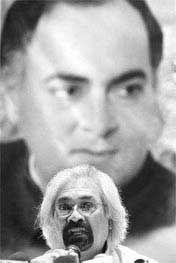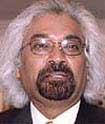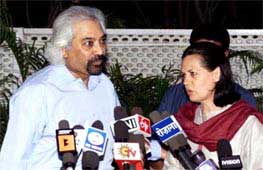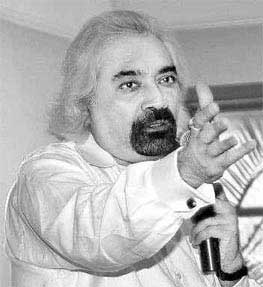Magazine
Sam's Trip

Trailing NRI telecom guru Sam Pitroda at the hustings.
|
It all began with an election-year TV commercial. “What the Congress Party couldn’t do in 50 years, we did in five,” gloated India’s Bharatiya Janata Party, which heads the coalition currently at the helm in New Delhi. The simple, pithy and hard-hitting tagline blankets the party’s print and other media campaigns as well. But inadvertently, the BJP image-builders and spin-doctors stepped on the tail of a dormant tiger. In faraway Chicago – far away from New Delhi, that is – a non-resident Indian read the line, put down his coffee mug and took furious umbrage.
Telecom guru Sam Pitroda, who had all but forsaken India and its slow bureaucratic ways after a brief and intense involvement in the country’s affairs as Chief Technology Advisor during the late Rajiv Gandhi’s regime in the mid 1980s, thought this was just too much. “To say that nothing was done in the last 50 years before the BJP came to power is not only an untruth, it’s also an insult to the Indian people,” he fumed, and promptly packed his bags for a month-long trip to India. He would join the Congress party, campaign against the BJP, and try – at the very least – to set the record straight. So, Pitroda has been jetting across the heat and dust of a country caught in the throes of a blazing summer as well as the fever of a five-yearly general election. He has spared himself the sweat and the grime of election rallies, and has confined himself to small, intimate tete-a-tetes with the urban elites and intellectuals, students and professionals. Pitroda is too smart a man not to know that this is but a microscopic constituency, a mere drop in the polling ocean compared to the teeming masses who will ultimately decide the election outcome. But he is also pragmatic enough to realize that this indeed is the only constituency he can hope to influence in this election. He and his work are known primarily to the India’s literate urban middle-class. Sadly though, this class – although it’s growing in numbers – is notorious for its political apathy, for using the polling-day holiday as just another opportunity to escape to a picnic spot. Pitroda however is unfazed. As he strides in for our meeting at Mumbai’s Press Club, his goatee dyed jet black to contrast with his white flowing mane of hair, you marvel at the zest and energy of a man who at 62 seems fit enough to run a marathon. But you can bet his doting wife Anu won’t let him risk it. As part of Pitroda’s entourage, she follows him at every pit-stop to ensure that he’s had his periodic cocktail of medicines. She was there at the Club too, with their daughter Rajal and doctor-friend (Chicago-based radiologist Piyush Vyas) in tow, to remind him that he had missed taking a tablet earlier that afternoon. And also to remind us, as Pitroda dutifully swallowed the pill, that her husband has gone through five major surgeries in recent years, including a quadruple bypass and a stent. He doesn’t look any worse for it, but we assure the good lady that we’ll go easy on her man. So, what does Sam Pitroda realistically expect to accomplish in this election campaign? “I want to bring to the fore the various accomplishments of the earlier regimes,” he says, “accomplishments on which the present BJP plans a free piggyback ride to victory. The same people who, till a few years ago, tried to ridicule us as computer cowboys, are now taking the sole credit for the nation’s progress in the field of information technology.”
There is of course, no doubt that Pitroda, with Rajic Gandhi’s backing, shepherded the country’s telecommunication sector to its present state-of-the-art status. Few will dispute that the IT boom in India was triggered by policy decisions that technocrat Pitroda pushed through during the Congress administration under Rajiv Gandhi. Also, if a considerable portion of India is “shining” – as the BJP would have us believe through its poll propaganda – the light comes in no small part from the advancements the country has made and the wealth it has created (in material as well as in brain-power) in the field of IT and related sectors. India’s foreign-exchange reserves recently crossed the $100-billion mark. To an extent, of course, this was an idea that was waiting to happen in the inexorable march of history. As early as the late 1970s and the early 1980s, Third World development scholars had foreseen that the smarter developing countries would eschew the road taken by the industrialized western nations which involved huge capital investment in technological infrastructure, and would leapfrog the costly intermediate phases into relatively low-cost modern technologies. This has become most apparent in the Indian IT industry. A telling example: there are more cell phones than land-line phones in Mumbai today. Pitroda’s critics would no doubt gloss over the individual’s role in this IT revolution, but it must be conceded that although he may have found himself in the right place at the right time, he also pressed the right buttons to bring the revolution’s benefits to the masses. It was C-DOT, the technology center set up in 1984 by Pitroda, that pioneered the ringing out of archaic phone systems countrywide and that paved the way for street-corner telephone booths mushrooming in the smallest towns. For a man who was born to a poor Gujarati family in Titlagarh (a small hamlet in tribal Orissa state), and who never used a telephone before he joined the Illinois Institute of Technology for a master’s degree in electrical engineering, Satyanarayan Gangaram Pitroda’s 50-plus global patents and his appointment as chief of World Tel (a UN agency for spreading telecommunication technology in poor countries) must rank as an example of supreme irony. But for all his jet-setting and hitech image, Pitroda has an endearing down-to-earth attitude toward technology – probably a legacy of his hardy Gujarati ancestors. He believes that any technology must have a very powerful utility value for the common man, and should be discouraged if it does not contribute handsomely to problem-solving for wide-ranging social issues. “Indians trained in hitech have a moral choice, symbolically speaking, do you want to work for your poor farmer or for Citibank?” Pitroda, as part of Rajiv Gandhi’s inner circle, had initiated welfare schemes in water-harvesting, sanitation, women’s health, and infant mortality. “We had recognized that India’s growing population was its biggest problem, but we couldn’t tackle it head-on because of the fear that hard, direct measures would result in another Emergency fiasco,” he says, recalling that during the Emergency imposed by Indira Gandhi during 1975-77, Sanjay Gandhi’s over-zealous efforts at population control had boomeranged. “It’s a political reality that can’t and shouldn’t be ignored.” Another political reality he accepts is the era of globalization and the dominance of the USA in major world forums. Pitroda has an interesting albeit long-winded definition of globalization. “Globalization means an Orissa-born Baroda University graduate like me listening to Dandiya music while driving on a highway near New York City in a car that’s assembled in California with Taiwan-made components, that’s marketed internationally by a company headquartered in Germany, and that’s retailed by a Sardarji in a Chicago suburb,” he remarks, tongue in cheek. “Globalization also means that India has to realize that it cannot afford to isolate itself from western-dominated institutions like the IMF and the World Bank,” he adds. But negotiating with them does not mean that Indians should allow the multinationals to walk all over them in their own country. “The key is to beat them at their own game, by making products that are world-class,” Pitroda points out. In any case, the multinational companies are interested only in a few high-profit consumer-goods sectors, so in sectors concerned with social welfare and development, issues which make a real difference to the life of ordinary Indians, there is no foreign competition, according to him. Talking about how Indian brains are making a difference at the international level, Pitroda backtracks a bit on the population question. Over the years, he has come to view the problem rather differently. “If we assume that a certain percentage of any population is born smart, India naturally ends up producing the largest number of high-quality brains,” he reasons. Add to this the comparative cost advantage, and it’s no wonder that the multinationals love to outsource to countries like India. Pitroda dismisses the current furore over the outsourcing. “It’s become a high-profile issue for two reasons. First, the timing. It’s the election year in America, so any small issue becomes a political football and tends to get bigger than it really is. Second, the Indians themselves need to be blamed for thumping their chests and proclaiming they are the chosen ones. Outsourcing would not have been so noticeable to the American public if we had shut our traps.” Pitroda believes that the whole matter will blow over once the U.S. presidential election runs its course, because outsourcing in terms of the actual revenue involved is such a pittance in the larger context of the American economy and also because every dollar that goes out in outsourcing, returns to the US with an ultimate profit of three dollars, he says. And who does he think will win that election? “It’s going to be close, but I have a hunch that Bush will win in the end,” the dyed-in-the-wool Democrat shrugs.
The matter-of-factness of his statement indicates clearly that while, like any other responsible world citizen, Pitroda is interested and curious about the American elections upto a point, his heart lies in what’s happening in India. At the same time though, Pitroda is non-committal and seemingly detached about the Indian election results as well. He gives the distinct impression that at the end of the day he is willing to rise beyond petty short-term party considerations when it comes to national issues like development. His larger concerns, to indulge in a little Yankee-speak, are “bipartisan.” For instance, his fine-print agenda for coming to India this time is to usher in the second telecom revolution in this country. The 800,000-odd PCOs which grew out of the first revolution of the 1980s have, according to Pitroda, fallen behind the times. “Their profitability has been eroded drastically by the advent of cell (mobile) phones and by the low long-distance rates,” he points out. Pitroda’s second revolution aims at making these PCOs profitable once again, besides taking the country closer to the global concept of e-money. The plan entails equipping the PCOs with a Mobile Digital Wallet, a palm-sized gadget that will connect users to their bank accounts, obviating the need to trudge to the branch for depositing or withdrawing money. Additionally, the Wallets in the PCO cubicles can be used for financial transactions where people can pay their electricity and phone bills with their secret individual code. The booth operators, in turn, would be paid for the number of transactions carried out. Using the patented Secure Wireless Application Platform (SWAP) technology, the Java-enabled mobile phone user can store all the personal data, including the credit/debit cards, ID cards and other security information into the mobile phone. While his hand-picked experts are working at a technology development center in Baroda, Pitroda meanwhile has met with top officials in India’s Communication and Information Technology ministry, and the plan is expected to take off in another couple of years. The gadget has already been launched successfully in Japan, and Pitroda is now targeting the Scandinavian and Middle Eastern markets. Similarly, on the issue of a uniform civil code which has been a potentially thorny issue involving the Muslims and which the BJP had advocated till it decided to drop it as an election issue, Pitroda is surprisingly pro-BJP. “Rajiv [Gandhi] had once told me that in the long run, a society cannot reach its developmental goals without such a code,” he reveals. But the question is whether the Indian society is ready for it, he asks, caressing his goatee. If only Rajiv had the will, Pitroda might have been speaking to us in a society with a uniform civil code, we remind him. Pitroda stops caressing his goatee, holds his earlobes in mock-submission, smiles sheepishly and agrees.
Surely Pitroda has fond memories of working with Rajiv Gandhi who allowed him a free rein on crucial policy matters, which in turn allowed him to make a long-term contribution to a vital sector in India’s developing economy. But does that nostalgia spill over beyond a productive friendship that grew on mutual trust and admiration? After all, what really is Sam Pitroda’s Congress Party connection? Post Rajiv, Pitroda has not been the force he once was. True, he admires Sonia Gandhi for single-handedly holding the party together, and Rahul Gandhi for his mature understanding of issues. But he hardly knows any of the Congress Party candidates for whom he’s indirectly canvassing, and wasn’t really a typical Congress-wallah even in his heyday. Hardly surprising therefore, that Pitroda, bereft of the political skills needed to survive in successive administrations, just about survived a heart attack during the Narasimha Rao regime that governed India soon after Rajiv Gandhi’s assassination. Pitroda recounts, as an aside, that the 1992 bypass cost him about $5,000 in a New Delhi hospital. The Indian government thoughtfully offered to foot part of the bill, but Pitroda hrefused on the ground that his U.S. insurance company would take care of it. “The company came back to me after I’d submitted the bills, saying there was a mistake – a zero was missing – because a bypass surgery in the U.S. costs nothing less than $50,000. They were so thrilled at my small claim, that they half-joked about sending American heart patients to India for the procedure.” Another potential area for outsourcing, Pitroda grins. More seriously, Pitroda rules out any direct involvement in the hustle-bustle of Indian politics. “I’m not here for any nominated position like a Rajya Sabha seat,” he says. It’s not that the flesh isn’t keeping up with a more-than-willing spirit, but more a realization that it’s about time a newer, younger generation took charge with its own fresh ideas. “More than half the country is in the below-35 age group, and several of them will be voting for the first time. I’m looking forward to seeing them take on challenges,” he says, warmly patting his 20-plus daughter Rajal’s head. While Pitroda’s son Salil is doing a Harvard MBA, Rajal spent the last two years in India working with the lobby group Confederation of Indian Industry in their Entertainment Division, exploring ways and means to finance the country’s film sector which has earned industry status. Rajal is now writing an autobiographical novel about her experiences as an NRI woman living in Mumbai. As the shadows lengthen across the club lawns, Pitroda and his entourage get ready to catch a flight for the Gujarat leg of their itinerary. The soft evening glow has a curious effect on Pitroda’s face – he now looks even more like a Viking setting out for battle. He pumps our hand with astonishing vigor, and as he leads his entourage to a waiting car at the club gate we can’t help thinking that the man, despite all his protestations, is straining at the leash to make a difference in the governance of his mother-country. Sambhai Pitroda may never have read Plato in the original. But he doubtless embodies the spirit of what the Greek philosopher once said: One of the penalties for hrefusing to participate in politics is that you end up being governed by your inferiors. PITRODA-SPEAK ON INFORMATION TECHNOLOGY: The other day, I saw a cartoon which said, “Honey, will you answer the television, I am watching the telephone.” That sums up where we are. As a social leveler, Information Technology ranks second only to Death. ON THE INDIAN PEOPLE: We can do it. We will do it. If we do not, who else will? A country of a billion people should be focused on the priorities of a nation going forward and not on petty politics. I would like technology to be the focus instead of going back to religion and history. I am happy to be a Hindu, but I don’t want religion to be an issue. Indians are capable of doing anything. Don’t underestimate them. My father who was fourth-grade educated was smarter than I am. I can assure you of that. Our frustration is that things are not happening fast enough. Many of our systems are stuck in the time of the British Raj. When I finish lunch and go out on the street and see a beggar, it hurts. I once went to a bank in India to open an account, and I was told to get introductions from two people. I said I am going to keep my money with you, why should I get introductions from people, I should be asking you for them. When I was in the water department, we wanted to spread some information on how to repair water pumps. We decided to print 100,000 booklets. But this is India, you pay for 100,000, you get only 50,000. Then the secretary decides to keep some 5,000 out of them, saying I might need it for some emergency. Then it goes down to the district level and every person decides to keep a little bit of it. Ultimately the person who needs the booklet does not get it. Self-esteem seems to be very fragile in India. People get hurt very easily. Sometimes I find everybody is waiting to be hurt. You say hello to him, not to me, I will not talk to you for 3 days! ON RAJIV GANDHI’S TENURE: It was during Rajiv’s tenure that many seeds were planted, seeds that flowered to give India strength and confidence. But more than science and technology, it is respect for secular values, respect for India’s social diversity that lies at the core of what Rajiv and other Congress leaders have stood for. The Indian diaspora in the US and the professional classes in India are the prime beneficiaries of Jawaharlal Nehru’s vision and unparalleled commitment to institution-building, a commitment that was taken forward by Rajiv. ON RAHUL GANDHI: He has worked under Michael Porter at Harvard for four years. I have known Rahul to be methodical, analytical, humble, mature and sincere. I talk to him often. He is a good listener, low-key, speaks very little but very well. A very good human being. He is also extremely intelligent and at ease with cyber technology. In fact I like him as an individual and he’s gradually getting the right grounding in politics.ºRahul stands for the next generation of India’s young leadership with a different style in politics that will hopefully transform India. We can no longer afford to be ruled by 70-year-old men. Rajiv had many dreams for India, which were deferred…delayed. Rahul is the one who can fulfil his father’s unfinished agenda. I was around when someone asked him if he planned to follow in his family’s footsteps and join politics. Rahul pondered for a few seconds, then slowly said: “I saw my father die for the country. If I don’t at least try, how can I ever live with myself?” That really said a lot about the kind of person he is. He’s very different from his sister Priyanka who is more outgoing, a people person. But I’m sure Rahul can grow into a people person, and Priyanka can be analytical too. ON DOTCOMS: The market had overreacted to the emergence of the dotcom companies. Today, the scene is more realistic. I do not think that the dotcoms have gone away, it is only the hype that has vanished. At the end of the day, the reality is that you are in the business to make money. Now people are now more concerned about cash flow and profit projection. Dotcoms will be around. Electronic money is a reality, and so are electronic banking and electronic shopping. ON HIMSELF: I came from a poor background, did something interesting, but always felt guilty about leaving so many of my kin behind. I was neither the best student nor the smartest in my class. There are other people who are equally capable, given an opportunity. I have repeatedly proved that I can do well for myself. I have done it thrice. I cannot be a billionaire but can live comfortably. The next question is whether I can do it for a large number of people like me. That makes for building more wealth than any bank. That is the joy of building a different kind of wealth. So many times, people have come up to me to thank me for what I have done. This really warms my heart. I am someone who looks at disruptive technology. I am not a guy who takes something that is small. If there’s a technology that will shake up everything, I am interested. But I’m better at starting things. I lose interest in running day-to-day stuff. I do not find it creative. That’s something I have learnt about myself after so many years. I never go to temples, have never worshipped. I believe in the karma of doing things. That’s my religion. ON HIS KIDS: My kids are my biggest achievement. I have two of the most gorgeous kids in the world. My son has studied at MIT and Harvard, and looks like an actor. Shabana Azmi is crazy about him. My daughter came to India for six days… it’s been two years and she’s still here, writing a book. Money can buy everything, but it can’t buy you great kids. |




